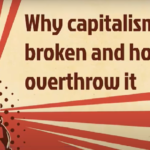The Global North – the need to prepare for two very different scenarios
The economic and political situation is clearly volatile rather than static. It can all go either way very quickly, that our response (or lack of one) is what will make it go one way or another. So we need to be preparing for highly different possible futures.
Capitalism triumphant:
On the one hand, if the illusion of the market (enforced by state power in all its guises – from police to education to media) reasserts itself as it managed so speedily after the sudden ripping of the veil in the financial crash of 2008, then the economic-industrial system will race full speed ahead, tearing into the social fabric and the fabric of the ecologies on which we all depend.
There is no point in trying to change such a system from within, since acting from ‘within’ already assumes that that is where the power lies, when in reality the power for positive change only ever lies outside that system. Similarly, there is no point using violence. As DeChristopher states in his interview with Chris Hedges:
“Violence is the realm our current power structure is really good at. They are eager to play that game. Any opportunity we give them [to use violence], they will win. That is the game they win at. The history of social movements in this country [the USA] shows that we are far more powerful with nonviolent civil disobedience than we are with what our audience considers to be violence.”
“Once our actions are deemed to be violent then that justifies repressive tactics on the part of the government,” he said. “With a nonviolent movement we are still inviting a strong reaction from the government or ruling authorities. We are inviting a powerful reaction against ourselves. But it undermines the moral legitimacy of our current government. That is the path we need to pursue. Rather than reinforcing their legitimacy we need to undermine their legitimacy.”
Capitalism collapsing:
But what if the future is very different to a ‘successful’ capitalism tearing full steam ahead into the fabric of the planet and able to use a tiny portion of the wealth extracted to buy off the vast majority, and another to maintain the ‘security’ services needed to defend their wealth? What if the legitimacy of the system is rapidly called into question as scenes unfold here that are similar to those we are witnessing in Ireland, Iceland, Greece and probably soon in Portugal and Spain?
There is a pattern here. Capitalism’s ‘success’ doesn’t only rest on its ability to ravage the planet; it also rests on its ability to use any economic downturn to ravage the fabric of society.
Economic ‘failure’ was used as an excuse for the IMF to privatise services, decimate societies and prop up or restore dictators across swathes of Latin America, Africa and elsewhere; and this approach is currently being used across southern Europe and is likely to reach the rest of us very soon.
Capitalism uses both its boom and its bust to deadly effect.
Ilargi writes that:
Some of the faces at the IMF may have changed, but the blueprints for these kinds of operations are still the same; if anything, they’ve become even more perfected. Teams of economic hitmen and henchmen are sent into a country to sell everything that isn’t nailed down to the highest bidder, but for the lowest price.
In order to achieve the last bit, all you need to do is write an agreement that is one on one contingent on an unrealistically high estimate of a group of assets, make sure their sale falls short of that estimate, and send in the hitmen again. And then you rinse and repeat until everything has been sold off. In Greece’s case, it’s all transport infrastructure first, because you know nobody really wants it, hence the sale price will be much lower than what the agreement called for, and in subsequent auctions you pick up the Acropolis and other national treasures.
Meanwhile, you raise taxes as much as you can, and then come back to do it again, while the public sector is gutted, along with health care, education and all those useless non-profitable parts of a society that benefit the people instead of the banks. Talking about banks, do we all still realize that all this is done to pay off debts to international banks that in many if not most cases would not even exist anymore if not for the tax revenues paid by the people of Greece, the rest of Europe, the US etc.? Or have we come to believe in “the recovery”, do we now think it’s real?
There is the feeling of endgame about this.
There is a powerful delusional win-lose logic that catches many – for the best or worst of motives – in the power games of economics, politics and media manipulation that prop up a certain system of power by saying it is unchangeable.
There is also a powerful refusal of that logic. The IMF may have torn through Latin America, but socialist and indigenous movements were close on its heels, tearing through Latin America themselves as left or left/indigenous governments have been elected in Chile, Uruguay, Brazil, Argentina, Ecuador, Bolivia, Paraguay, Venezuela and now Peru. Meanwhile, American and European corporate power may have maintained elderly dictators to do their bidding throughout North Africa and the Middle East but the time when they can say ‘there is no alternative’ is over.
But what is the alternative?
Without a clear picture of how society can function without corporate power, then such resistance – the demonstrations and protests – can only fail or be co-opted.
The kind of political change that is needed isn’t going to be achieved through reform or revolution focused on seizing the same levers of power that work by making people feel powerless.
To resist the attempts of those who seek to drag yet more wealth away from ordinary people to fill the coffers of those who brought us the financial crisis, we need to clarify our understanding of how the system as a whole is changing and needs to change, fast; and create the spaces for prefiguring the kind of society we want.
This is the seventh in a series of ‘Case for the Commons: the kinder Society we want’ posts – the eighth will very briefly and roughly sketch how people are seeking to prefigure and bring into being a kinder society. Read the rest of the series here.



This is an atcirle that makes you think “never thought of that!”